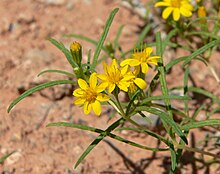Pectis is a genus of flowering plants in the family Asteraceae described as a genus by Linnaeus in 1759.[4][5][6]
| Pectis | |
|---|---|

| |
| Pectis papposa | |
| Scientific classification | |
| Kingdom: | Plantae |
| Clade: | Tracheophytes |
| Clade: | Angiosperms |
| Clade: | Eudicots |
| Clade: | Asterids |
| Order: | Asterales |
| Family: | Asteraceae |
| Subfamily: | Asteroideae |
| Tribe: | Tageteae |
| Subtribe: | Pectidinae |
| Genus: | Pectis L.[1] |
| Type species | |
| Pectis linifolia | |
| Synonyms[3] | |
| |
The name is derived from the Latin word pecten, meaning "comb." It refers to the marginally-bristled leaves or the pappus form. These plants vary in appearance but they usually bear yellow daisy-like flower heads.[7] Members of the genus are known generally as cinchweeds (current usage) or chinchweeds (older name).[8]
They are native to the Americas, including the West Indies.[9][10][11][12][13]
Species accepted by Plants of the World Online as of December 2022:[14]
- Pectis amplifolia D.J.Keil
- Pectis angustifolia Torr.
- Pectis arida D.J.Keil
- Pectis barberi Greenm.
- Pectis berlandieri DC.
- Pectis bonplandiana Kunth
- Pectis brachycephala Urb.
- Pectis brevicaulis Urb.
- Pectis brevipedunculata Sch.Bip.
- Pectis burchellii Baker
- Pectis cajamarcana D.J.Keil
- Pectis canescens Kunth
- Pectis capillipes (Benth.) Hemsl.
- Pectis carthusianorum Less.
- Pectis caymanensis (Urb.) Rydb.
- Pectis christii Urb.
- Pectis ciliaris L.
- Pectis congesta Sch.Bip.
- Pectis coulteri Harv. & A.Gray
- Pectis cubensis Griseb.
- Pectis cylindrica Rydb.
- Pectis decemcarinata McVaugh
- Pectis decumbens Sch.Bip.
- Pectis depressa Fernald
- Pectis diffusa Hook. & Arn.
- Pectis domingensis Urb.
- Pectis elongata Kunth
- Pectis ericifolia D.J.Keil
- Pectis exilis D.J.Keil
- Pectis exserta McVaugh
- Pectis fasciculiflora DC.
- Pectis filipes Harv. & A.Gray
- Pectis × floridana D.J.Keil
- Pectis gardneri Baker
- Pectis glaucescens (Cass.) D.J.Keil
- Pectis gracilis Baker
- Pectis guaranitica Chodat
- Pectis haenkeana Sch.Bip.
- Pectis harryi D.J.N.Hind & Frisby
- Pectis hassleri D.J.Keil
- Pectis havanensis Urb.
- Pectis holochaeta (S.F.Blake) D.J.Keil
- Pectis humifusa Sw.
- Pectis imberbis A.Gray
- Pectis incisifolia I.M.Johnst.
- Pectis juniperina Rydb.
- Pectis latisquama Sch.Bip. ex Greenm.
- Pectis leavenworthii Standl. ex Leavenw.
- Pectis leonis Rydb.
- Pectis liebmannii Sch.Bip. ex Hemsl.
- Pectis linearifolia Urb.
- Pectis linearis La Llave
- Pectis linifolia L.
- Pectis longipes A.Gray
- Pectis luckoviae D.J.Keil
- Pectis masonii Cuatrec.
- Pectis monocephala Cuatrec.
- Pectis mornicola Urb. & Ekman
- Pectis multiceps Urb.
- Pectis multiflosculosa (DC.) Sch.Bip.
- Pectis multiseta Benth.
- Pectis odorata Griseb.
- Pectis oligocephala Sch.Bip.
- Pectis papposa Harv. & A.Gray
- Pectis peruviana D.J.Keil
- Pectis pimana Laferr. & D.J.Keil
- Pectis pinosia Urb.
- Pectis pringlei Fernald
- Pectis propetes Greenm.
- Pectis prostrata Cav.
- Pectis pumila D.J.Keil
- Pectis purpurascens Urb. & Ekman
- Pectis purpurea Brandegee
- Pectis pusilla Urb.
- Pectis pygmaea Kunth
- Pectis repens Brandegee
- Pectis rigida Baker
- Pectis ritlandii R.A.Howard & W.R.Briggs
- Pectis rusbyi Greene ex A.Gray
- Pectis samanensis Urb.
- Pectis saturejoides (Mill.) Sch.Bip.
- Pectis schaffneri Sch.Bip. ex A.Gray
- Pectis sessiliflora Sch.Bip.
- Pectis sinaloensis Fernald
- Pectis stella Malme
- Pectis stenophylla A.Gray
- Pectis subeglandulosa Urb. & Ekman
- Pectis subsquarrosa Sch.Bip.
- Pectis substriata Rusby
- Pectis tenuicaulis Urb.
- Pectis tenuifolia Sch.Bip.
- Pectis uniaristata DC.
- Pectis vandevenderi B.L.Turner
- Pectis vollmeri Wiggins
References
edit- ^ "Genus: Pectis L." Germplasm Resources Information Network. United States Department of Agriculture. 1996-09-17. Retrieved 2012-02-18.
- ^ lectotype designated by N. L. Britton et Millspaugh, Bahama Flora 456 (1920)
- ^ Flann, C (ed) 2009+ Global Compositae Checklist
- ^ Linnaeus, Carl von. 1759. Systema Naturae, Editio Decima 2: 1189, 1221, 1376 in Latin
- ^ Tropicos, Pectis L.
- ^ Flora of North America Vol. 21 Page 222 Pectis Linnaeus, Syst. Nat. ed. 10. 2: 1221. 1759.
- ^ Quattrocchi, Umberto (2000). CRC World Dictionary of Plant Names. Vol. III M-Q. CRC Press. p. 1985. ISBN 978-0-8493-2677-6.
- ^ Kearny, Thomas Henry; Robert Hibbs Peebles (1960). Arizona Flora. Berkeley, California: University of California Press. ISBN 978-0-520-00637-9.
- ^ Keil, D. J. 1975. Revision of Pectis sect. Heteropectis (Compositae: Tageteae). Madroño 23: 181–191.
- ^ Keil, D. J. 1977. A revision of Pectis section Pectothrix (Compositae: Tageteae). Rhodora 79: 32–78.
- ^ Keil, D. J. 1977b. Chromosome studies in North and Central American species of Pectis L. (Compositae: Tageteae). Rhodora 79: 79–94.
- ^ Keil, D. J. 1978. Revision of Pectis section Pectidium (Compositae: Tageteae). Rhodora 80: 135–146.
- ^ Keil, D. J. 1986. Synopsis of the Florida species of Pectis (Asteraceae). Sida 11: 385–395.
- ^ "Pectis L." Plants of the World Online. Royal Botanic Gardens, Kew. 2022. Retrieved 2 December 2022.
External links
edit- Media related to Pectis at Wikimedia Commons
- Data related to Pectis at Wikispecies
- Jepson Manual Treatment
- USDA Plants Profile